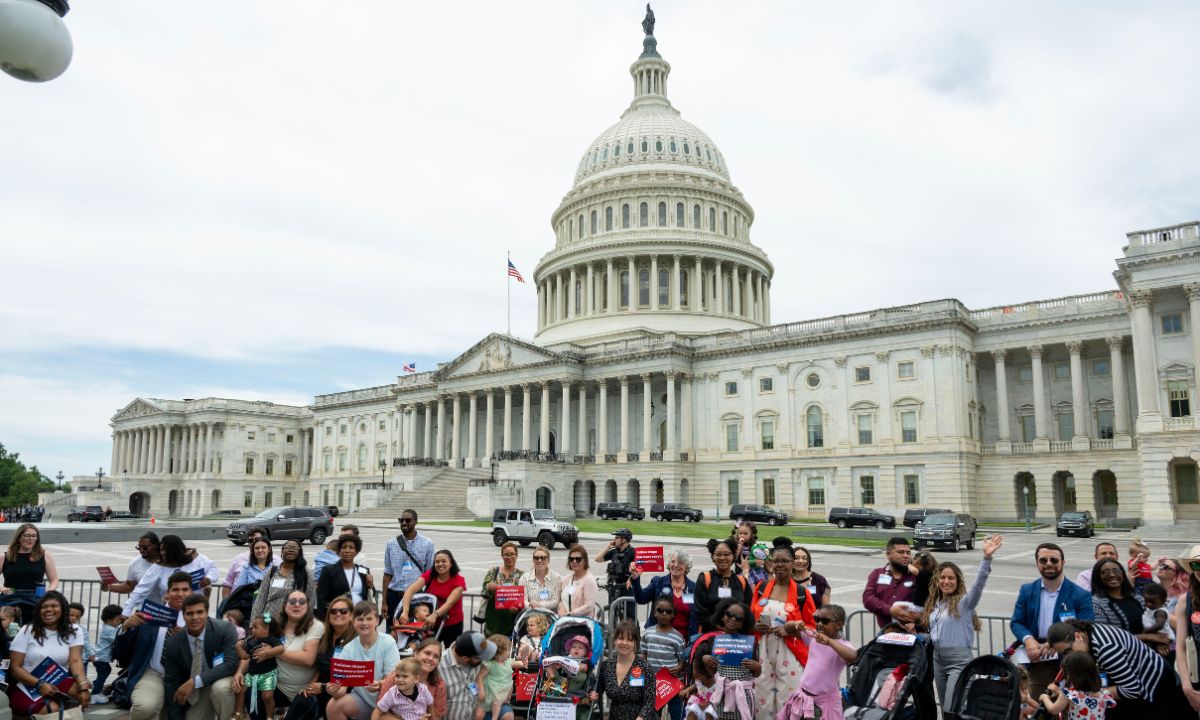What Babies Need from Congress Right Now
Boteach: Babies can’t speak for themselves, so families and early childhood advocates are demanding that Congress to invest in our youngest kids.

Join our zero2eight Substack community for more discussion about the latest news in early care and education. Sign up now.
Last week, parents from every corner of America headed to Capitol Hill — strollers, diaper bags and all — to demand that Congress protect and strengthen critical early childhood programs that millions of babies rely on. Babies can’t speak for themselves, so families and early childhood advocates are raising their voices to demand that Congress invest in our youngest kids’ health, development and future.
Their trip to Washington, D.C., could not have been timelier. Days after their departure, the House voted in favor of a disastrous budget that puts their priorities in jeopardy. At the rally, we heard directly from a broad, bipartisan swath of legislators — including House Democratic Whip Katherine Clark of Massachusetts, Republican Rep. Juan Ciscomani of Arizona, and Democratic Reps. Rosa DeLauro of Connecticut and Rashida Tlaib of Michigan — affirming the necessity of these programs. As the bill moves to the Senate, the upper chamber would be wise to listen to Strolling Thunder families and stop these reckless cuts in their tracks.
On the chopping block? Medicaid, which covers over 40% of births in the US; the Supplemental Nutrition Assistance Program (SNAP), which provides food to 4.5 million children under age 5; and funding for families and states that cover child care, foster care and other basic needs.
These programs are lifelines that give kids a solid start, especially for families who face extra hurdles because of their income, where they live, a disability or their background.
Parents like Rachell Dumas, a nurse and maternal health advocate from Atlanta, who shares that, “After nine pregnancy losses, I thought the hardest part was over once my son was born. But I was wrong. PTSD from years of trauma made it hard to bond with my miracle baby, and there was no system in place to support us. Babies don’t just inherit our love. They inherit our pain, too.”
That’s why Dumas is telling Congress to protect and strengthen the support new parents need. This includes safeguarding health and nutrition by protecting and strengthening Medicaid and SNAP so every baby receives essential well‑baby visits, immunizations and nutritious meals.
And take parents like Charlein Downs from Delaware, whose son, Jeremiah, has benefited enormously from Early Head Start. “[Early Head Start teachers] have given me clear guidance on what milestones Jeremiah should be reaching and practical tools I can use to help him grow. His teachers are amazing — not just for his education, but for mine,” Downs says.
In many rural areas, these programs are the only option for infant care, and they set children up for the strongest start in school. Cutting them doesn’t just shrink opportunities; cuts force families to choose between work, health and their child’s future.
Dumas and Downs joined with other parents on Capitol Hill, not as lobbyists but as living proof of what’s at stake. They’re continuing to ask for more than promises: They want protection for programs like Medicaid and SNAP, stronger funding for Early Head Start and other early learning opportunities, and a fair shot for their children to thrive.
Parents shared what’s at stake for their babies, while emphasizing that this isn’t just an individual family problem; it’s an economic problem.
Between birth and age 3, a child’s brain forms more than 1 million neural connections every second. When babies’ caregivers get the support they need to provide a nurturing home, stimulating surroundings and regular check‑ups, babies learn to talk, think and manage feelings much faster. Without those supports, kids are more likely to have health problems, fall behind in school or struggle with behavior, costing all of us billions later on.
Research shows that every $1 we spend on a child under 3 pays back up to $13 in benefits, like more graduates, lower health bills and less crime spending. But when early supports are cut, parents miss work, employers lose productivity, tax revenues shrink and public spending climbs as families turn to emergency rooms and food pantries.
Get stories like these delivered straight to your inbox. Sign up for The 74 Newsletter


;)
